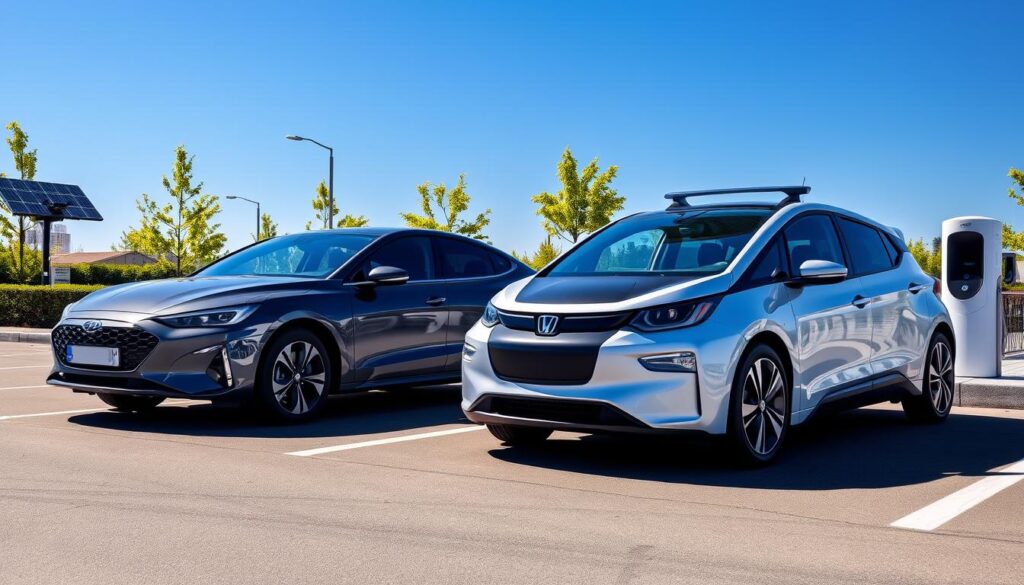The debate between hybrid and electric cars is growing in the car world. People want cars that are good for the planet and save money. Knowing the differences between hybrids and electric cars is key to choosing the right one for you.
This guide will help you understand the details of both types. You’ll learn what matters most to you and the planet. This way, you can make a choice that fits your life and values.
In This Guide
Understanding the Basic Differences Between Hybrid and Electric Cars
Choosing between a hybrid and an electric vehicle (EV) requires knowing their main differences. Both have their own benefits, but their powertrain technology is what sets them apart.
How Hybrid Powertrains Work
Hybrid cars use a gasoline engine and an electric motor together. They switch between these sources based on speed. The engine kicks in for faster driving, while the electric motor helps in the city.
This setup makes hybrids more fuel-efficient and cuts down on emissions. It’s a step up from traditional gas cars.
The All-Electric Vehicle System
Electric vehicles (EVs) run solely on an electric motor and battery. They don’t have a gasoline engine. Instead, they charge from an outlet or public station.
This means EVs produce no direct emissions. They also offer a quieter and more responsive drive.
Key Technical Distinctions
- Hybrids have smaller batteries and use gas for longer trips. EVs have bigger batteries for longer single-charge drives.
- Hybrids need regular checks for both engine and electric parts. EVs have fewer parts and need less upkeep.
- Refueling hybrids means stopping at a gas station. EVs can be charged at home or public stations.
| Feature | Hybrid Vehicle | Electric Vehicle (EV) |
|---|---|---|
| Powertrain | Combination of gasoline engine and electric motor | Fully electric motor, no gasoline engine |
| Fuel Source | Gasoline and electricity | Electricity only |
| Emissions | Reduced emissions compared to traditional gasoline vehicles | Zero direct emissions |
| Driving Range | Shorter electric-only range, but longer overall range | Longer electric-only range, but dependent on battery size |
| Refueling/Recharging | Gasoline and occasional charging | Charging at home or public charging stations |
Knowing the key differences between hybrids and EVs is vital. They both have unique advantages. Think about your needs and lifestyle to choose the best one for you.
Environmental Impact and Emissions Comparison
Both hybrid and electric vehicles are key in reducing emissions and reaching sustainability goals. It’s important to know how they differ in environmental impact to make a smart choice.
Hybrid cars use both a traditional engine and an electric motor. This setup makes them more fuel efficient than regular cars. They also reduce emissions and lower your carbon footprint. This makes hybrids a good choice for those who want to help the environment but still need a traditional car’s convenience.
Electric cars, on the other hand, don’t produce any emissions because they run on electricity. They get their power from the electric grid, which can be powered by renewable energy. This makes electric cars a top pick for those looking to minimize their environmental impact and leave a smaller carbon footprint.
| Metric | Hybrid Vehicles | Electric Vehicles |
|---|---|---|
| Emissions | Reduced emissions compared to traditional gas-powered cars | Zero direct emissions |
| Fuel Efficiency | Improved fuel efficiency through combined gas and electric power | Highly efficient, with no need for gasoline |
| Environmental Impact | Contributes to reduced carbon footprint and supports environmental goals | Minimal environmental impact, especially when paired with renewable energy |
Both hybrid and electric vehicles are great for reducing emissions and improving fuel efficiency. They are good options for those who care about the environment. The choice between them depends on personal preferences, driving habits, and local infrastructure.
Initial Purchase Costs and Available Tax Incentives
Buying a hybrid or electric vehicle (EV) might cost more than a traditional car at first. But, the long-term savings can be big. Luckily, there are tax incentives and rebates to help lower the cost of ownership.
Federal and State Rebates
The federal government gives tax credits of up to $7,500 for new EVs. Many states offer extra help too. For example:
- California’s Clean Vehicle Rebate Project gives up to $7,000 for certain EVs
- New York’s Drive Clean Rebate offers $2,000 for new EVs
- Colorado’s tax credit can be up to $5,000 for new EVs
These incentives can cut down the initial cost of EVs and hybrids. This makes them more affordable for many people.
Purchase Price Breakdown
When thinking about buying a hybrid or EV, look at the total cost of ownership. EVs and hybrids might cost more upfront. But, they often save on fuel and maintenance over time. Plus, tax incentives and rebates can help make them more affordable.
Long-term Financial Benefits
The savings from less fuel and maintenance can make up for the higher initial cost. These savings, along with tax incentives and rebates, make eco-friendly vehicles a smart choice. They are cost-effective for many buyers.
Hybrid vs Electric Car: Performance and Driving Experience
Hybrid and electric cars offer different driving experiences. Knowing these differences helps you choose the right car for you. It depends on what you need and want from a car.
Electric cars are known for their quick start and smooth speed. They feel fast and easy to drive. This makes them great for those who love a fun drive.
Hybrid cars, however, feel more like traditional cars. They mix electric and gasoline power. This gives a smoother and more predictable drive, which some people prefer.
Electric cars usually perform better than hybrids. Their electric motors make them quick and easy to handle. Hybrids focus more on saving fuel, but they still drive well.
Choosing between a hybrid and an electric car depends on what you like. If you want a fast and exciting drive, an electric car might be best. But if you like a more traditional feel and good fuel efficiency, a hybrid could be better.
Charging Infrastructure and Fuel Accessibility
The need for green cars is rising fast. This makes it key to look at charging and fuel options for hybrids and EVs. We’ll compare these to help you choose wisely.
Public Charging Networks
More public charging spots are popping up in the U.S. They offer different charging levels, from slow to fast. How many and where these are can really help with charging your EV on the move.
Home Charging Solutions
Being able to charge at home is a big plus for hybrids and EVs. A Level 2 charger at home means you can top up your car overnight. This makes your car ready for the next day and boosts fuel efficiency.
Gas Station Availability
Hybrids, however, use both charging and gas. With gas stations everywhere, hybrids don’t worry about running out of fuel. This helps avoid the range anxiety EVs sometimes face.
When picking between a hybrid or an EV, think about charging and fuel access. Knowing the good and bad of each helps match your car to your life and driving habits.
Battery Technology and Longevity
The rise of electric vehicles (EVs) has made battery life and performance key for buyers. New battery tech has boosted the battery life and dependability of EVs.
The type of battery used greatly affects how long it lasts. Lithium-ion (Li-ion) batteries, common in EVs, have gotten better over time. They now hold more energy, charge faster, and last longer. Newer types like lithium-iron-phosphate (LFP) and solid-state batteries are coming. They promise longer life and better safety.
- Lithium-ion batteries usually last 8-10 years or 100,000-200,000 miles before they start to lose charge.
- Improvements in cooling, cell chemistry, and design have helped batteries last longer, even in tough conditions.
- Many car makers offer long warranties on batteries, up to 8-10 years, giving owners more confidence.
Keeping your EV battery in good shape can also help it last longer. This includes occasional conditioning and smart charging. As battery tech keeps getting better, EVs will become even more appealing for the long haul.

“The future of transportation is electric, and the key to its success lies in the continued advancement of battery technology.”
Maintenance Requirements and Service Costs
When it comes to keeping your car in top shape, hybrids and electric cars have different needs. Knowing what maintenance and service costs are involved helps you choose the right car for you.
Regular Service Intervals
Hybrids need more frequent check-ups than electric cars. This is because hybrids have a complex setup that mixes a gas engine with an electric motor. They need regular tune-ups and oil changes to run smoothly. Electric cars, with fewer parts, need less upkeep and can go longer between services.
Common Repair Issues
- Hybrids may face battery wear and tear, leading to expensive replacements.
- Electric cars, though, have strong batteries. But they might run into issues with charging and software problems.
Specialized Technician Needs
Fixing hybrids and electric cars needs special skills and tools. Owners might have to find certified techs or service centers with the right know-how. This can increase the cost of ownership and limit service options in some places.
Knowing the maintenance and service costs for hybrids and electric cars helps you make a smart choice. It ensures your choice fits your maintenance needs and cost of ownership goals.
Range Anxiety and Travel Considerations
Electric vehicles (EVs) often make people worry about running out of battery. This worry, called range anxiety, is real. EVs’ range changes based on battery size, driving conditions, and the vehicle itself. Hybrid vehicles, on the other hand, can go further because they use both an engine and an electric motor.
If you’re thinking about getting an EV, plan your trips well. Most EVs can go 200-300 miles on one charge. This might be enough for daily drives and short trips. But for longer trips, you’ll need to stop for charging, which can slow you down.
Hybrid vehicles switch between gas and electric smoothly. They offer a longer range and don’t need as much planning for long trips. This is great for those who like to travel or have changing driving needs.
- EV range can vary significantly, requiring careful trip planning
- Hybrid vehicles offer a longer overall range and more flexibility for travel
- Charging infrastructure and accessibility is an important consideration for EV owners
Choosing between an EV or a hybrid vehicle depends on your driving habits and trips. Knowing how far each can go and how to charge them helps you choose the right one for you.

“The range of an electric vehicle is a critical factor in its usability and adoption. As the technology continues to improve, we’ll see more EVs that can travel longer distances on a single charge.”
Resale Value and Depreciation Rates
When thinking about the long-term cost of owning a car, the resale value and how much it depreciates are key. The used car market for eco-friendly cars has its own rules. These rules can greatly affect your investment.
Market Trends
Hybrid cars usually keep their value better than electric cars. This is because hybrids can use both gasoline and electric power. This makes them more flexible for owners. On the other hand, electric cars depreciate faster because of new, better technology coming out.
Future Value Predictions
Experts say that as more people start using electric cars, the value of both hybrid and electric cars will stay steady. Better battery life, more charging spots, and more people accepting these cars will help their value. This makes them a good choice for the future.
| Vehicle Type | 3-Year Depreciation Rate | 5-Year Depreciation Rate |
|---|---|---|
| Hybrid | 40% | 50% |
| Electric | 50% | 60% |
The table shows how much hybrid and electric cars depreciate over time. It shows hybrids might be a better choice for keeping value. But remember, many things can change these numbers, like the car model and the market.
Climate and Geographic Considerations
Choosing between a hybrid vehicle or an electric vehicle (EV) depends on climate and geography. The performance and efficiency of these cars vary by region in the United States. This is due to different environmental conditions.
In colder climates, winter weather affects hybrid vehicles and EVs. Extreme cold can reduce battery performance, range, and charging times. This can lower their efficiency. On the other hand, warmer climates are better for EVs, as their batteries work best in mild temperatures.
- Hybrid vehicles may perform better and use less fuel in cold weather than all-electric models.
- Electric vehicles do well in warmer areas, where their batteries work efficiently without cold weather issues.
- Drivers in mountainous or hilly areas might prefer hybrid vehicles for better ascent and towing.
Choosing between a hybrid or electric vehicle depends on your local climate, driving needs, and personal preferences. Understanding the unique aspects of each region helps make an informed choice. This choice should align with your lifestyle and environmental goals.
“The right choice between a hybrid or electric vehicle depends on your local climate and driving conditions. Consider the unique advantages and challenges of each technology in your region.”
Latest Technology Features and Innovation
As electric and hybrid vehicles evolve, new tech is making driving better. You’ll find smart charging and connected car features. These innovations change how you use your car.
Smart Charging Capabilities
Charging systems are getting smarter, making it easier to power up your car. They let you schedule charging for when electricity is cheap. You also get updates on charging status and alerts for battery care.
Connected Car Features
Today’s cars are more connected than ever. They offer cool features like voice control and wireless music. You can even control some car functions from your phone.


Pingback: 10 Best Cars for Beginners: 2024 A Comprehensive Guide